Cops vs Thugs Blu-ray Movie
HomeCops vs Thugs Blu-ray Movie 
Special Edition | 県警対組織暴力 / Kenkei tai soshiki bōryoku / Blu-ray + DVDArrow | 1975 | 100 min | Not rated | May 23, 2017
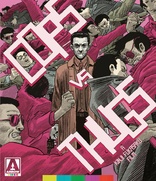
Movie rating
7.3 | / 10 |
Blu-ray rating
| Users | 0.0 | |
| Reviewer | 4.0 | |
| Overall | 4.0 |
Overview
Cops vs Thugs (1975)
In Kurashima City, there are two yakuza families; the Kawade, who use political connections to further their activities, and the Ohara, who have an alliance with the local police. When Ohara acting boss Hirotani usurps a staged land deal away from Kawade, thanks to the help of his police friend Kuno, a war breaks out. At the same time, Kuno's superiors start cracking down on the yakuza and command the cops stop fraternising with criminals.
Starring: Bunta Sugawara, Hiroki Matsukata, Tatsuo Umemiya, Tôru Abe, Tatsuo EndôDirector: Kinji Fukasaku
| Foreign | Uncertain |
| Drama | Uncertain |
| Crime | Uncertain |
| Film-Noir | Uncertain |
| Heist | Uncertain |
| Action | Uncertain |
| Thriller | Uncertain |
Specifications
Video
Video codec: MPEG-4 AVC
Video resolution: 1080p
Aspect ratio: 2.36:1
Original aspect ratio: 2.35:1
Audio
Japanese: LPCM 2.0 (48kHz, 16-bit)
Subtitles
English
Discs
Blu-ray Disc
Two-disc set (1 BD, 1 DVD)
DVD copy
Playback
Region A (B, C untested)
Review
Rating summary
| Movie | 4.0 | |
| Video | 3.5 | |
| Audio | 3.5 | |
| Extras | 2.5 | |
| Overall | 4.0 |
Cops vs Thugs Blu-ray Movie Review
Reviewed by Jeffrey Kauffman May 22, 2017It’s maybe just a little ironic that so many outsiders tend to view Japan as one of the most orderly nations in the world, a polite, refined society comprised of deferential and respectful sorts where the perhaps traumatic memories of the horrors of the end of World War II for the country have made folks trepidatious about conflict. And yet, as any number of yakuza films through the years have proven, Japan thinks of itself at least somewhat differently, highlighting what in some cases is open gang warfare and a proclivity towards lots of illicit behaviors. There are some almost comical contrasts between non-Japanese perceptions of Japan and how at least some elements of Japanese culture are portrayed in some of the grittier Japanese crime films, and that may in fact be at least one reason why so many films in this subgenre are so genuinely shocking to Western viewers. Kinji Fukasaku’s filmography is filled with a number of crime oriented outings, including the Battles Without Honor and Humanity franchise (which in addition to this first film also includes Hiroshima Death Match, Proxy War, Police Tactics and Final Episode), though he may be best remembered by at least some on this side of the pond for his contributions to the international co-production of 1970’s Tora! Tora! Tora! or for his now iconic final film, Battle Royale, a film which (as I mentioned in our Battles Without Honor and Humanity Blu-ray review) bears more than a few passing resemblances to the much later The Hunger Games 4-Film Complete Collection. There are certain content and stylistic similarities between Cops vs. Thugs and some of the Battles Without Honor and Humanity films, including internecine conflicts between various gangs, as well as a somewhat jaundiced view of both the socioeconomic and sociopolitical climates of Japan in the seventies.
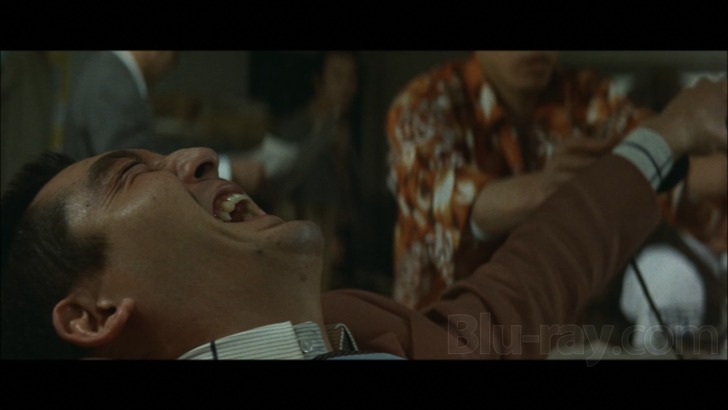
Part of the similarity to Battles Without Honor and Humanity is evident as soon as the credits sequence, where a “brief history of time”, or at least warring yakuza clans, is documented, with hits, arrests and other nefarious doings trotted out in quick succession, amply depicting a fractious and dangerous environment. (It's probably no mere coincidence that Cops vs. Thugs was written by Kazuo Kasahara, who also wrote the first several films in the Battles Without Honor and Humanity franchise.) The two main nemeses are the Kawade gang, a group which has some connections in the government which allow the gang to get away with criminal activity that would otherwise have landed them all in stir a long time ago. Their arch enemies are the Ohara gang, who have their own connections, albeit to police, in what might be cheekily seen as a “more direct” route to getting away with illicit activity. There's actually quite a bit of salient information doled out in the brief history shown during the credits, and some viewers may actually want to pause and rewind to understand what amounts to the dissolution of one gang, the election of a former gang member to a relatively high political office, and the simmering interrelationships between the two gangs.
Kind of interestingly, and perhaps saliently in terms of understanding some of the subtext involved, it’s a land deal that ultimately brings this already wobbly house of cards to its breaking point. The Ohara gang’s leader, Kenji Hirotani (Hiroki Matsukada), has some “inside” help from the local cops which allows him to basically to undercut the Kawade gang. But already Fukusaku and Kasahara have developed an ambience where there are no good guys and no bad guys, at least in the traditional sense. Everyone, including focal cop Tokumatsu Kuno (Bunta Sugawara), exists in a miasma of moral shades of gray, and it’s part of Cops vs. Thugs’ odd, almost carnival like, atmosphere that it really doesn’t matter who, cop or thug, is being featured in any given scene, chances are there are signs of turpitude. There are so many layers of degradation, scheming and back stabbing at play in the film, that at times the intersecting relationships and plot points unfold like the Japanese equivalent of Russian nesting dolls.
There’s an intentionally disjunctive feeling to a lot of Cops vs. Thugs, one that is obviously designed to keep the audience feeling off kilter, never knowing whom to trust (if anyone), or perhaps even more importantly, whom to “identify” with. In what might be one slight if understandable failing of the film, there’s no traditional person (or even set of people) to root for here, since everyone is so morally ambiguous. That said, the film is positively visceral in detailing the concatenation of social and economic elements that helped to create a surprisingly vicious environment in mid- seventies Japan (the film begins with one of those “based on real life” announcements, though I’m frankly not sure how literally true the statement might be, even if the general outlines of the tale seem indisputably authentic). As with many Fukasaku films, there is violence galore, some of it kind of funny (an early scene with a cop upbraiding some petty thieves is kind of comical in an almost Three Stooges kind of way), but with other scenes providing some gut wrenching moments, all of it staged with Fukasaku’s typical flourishes (which include his almost patented use of handheld cameras). Cops vs. Thugs asks a lot of questions, and perhaps has the wisdom not to answer all (or maybe even any) of them, but the upshot is those who tend to think of Japan as an inherently ordered society may be rethinking that assessment as the film comes to a close.
Cops vs Thugs Blu-ray Movie, Video Quality 
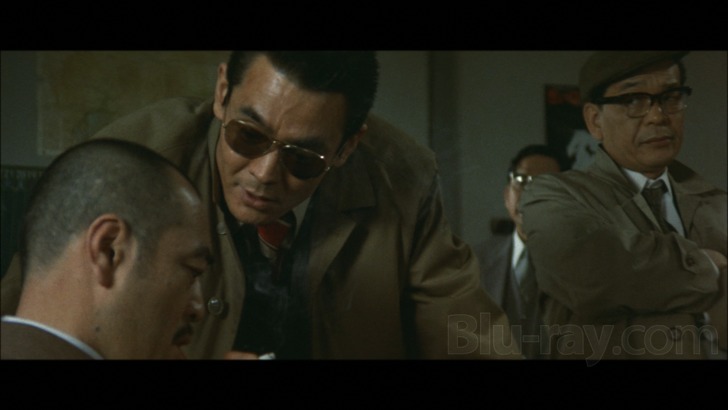
Cops vs. Thugs is presented on Blu-ray courtesy of Arrow Video with an AVC encoded 1080p transfer in 2.36:1. Arrow's insert booklet contains only a generic statement that "the film was remastered in high definition and supplied for this release by Toie Company, Ltd.", something that may indicate less than optimal source elements and no real restoration process. This has a fairly dated look, with a kind of drab palette that suggests fading, though admittedly when the film ventures outside in bright daylight environments, things perk up considerably. Overall, though, there's a pretty brown appearance to much of the transfer, especially in more dimly lit interior environments. As can be seen in some of the screenshots accompanying this review, Fukasaku plays with the imagery, introducing stills (some of which aren't in great shape, clarity wise, as evidenced by screenshots 11 and 12) and some black and white material. Grain is fairly heavy throughout the presentation, and while it's arguably on the chunky side in some darker scenes, there aren't really any significant resolution issues.
Cops vs Thugs Blu-ray Movie, Audio Quality 
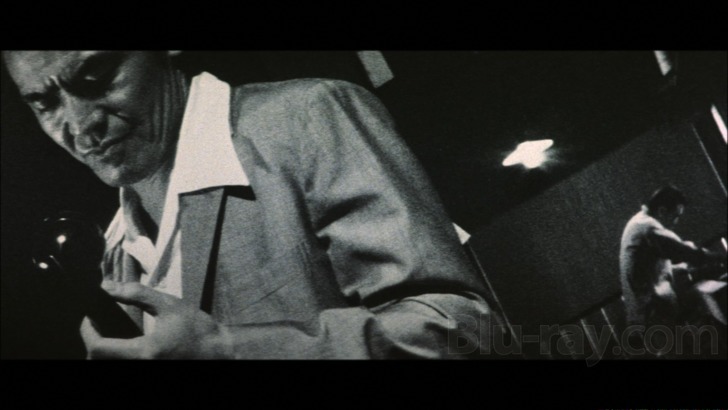
Cops vs. Thugs features an LPCM 2.0 mono track in the original Japanese. This is a pretty raucous soundtrack at times, one that can sound just slightly boxy at louder amplitudes, but which still delivers dialogue, effects and score clearly and with generally good prioritization. Aside from what is inherent narrowness, there aren't really any issues in terms of damage or distortion.
Cops vs Thugs Blu-ray Movie, Special Features and Extras 
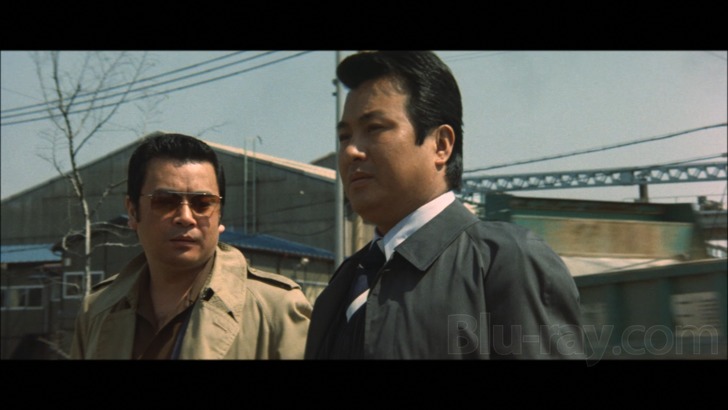
- Beyond the Film: Cops vs. Thugs (1080p; 9:13) features Fukasaku biographer Sadao Yamane.
- All Under the Gun (1080p; 13:38) is a visual essay by Tom Mes dealing with some of the moral shades of gray in many Fuakasaku films.
- Archive Behind the Scenes Footage (1080p; 4:59) features Fukasaku himself discussing on screen violence, followed by scenes of on screen violence being shot.
- Theatrical Trailer (1080p; 3:16)
Cops vs Thugs Blu-ray Movie, Overall Score and Recommendation 
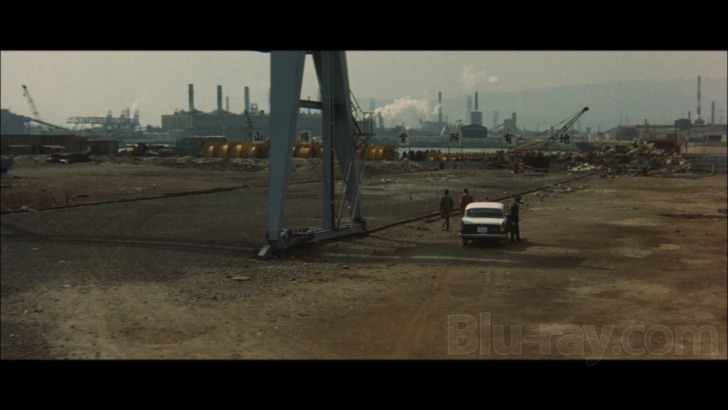
Cops vs. Thugs is one of the more bracing yakuza efforts from Fukasaku, and anyone who's a fan of his Battles Without Honor and Humanity will almost certainly enjoy this film as well. There are no heroes in this film, at least not in the traditional sense, so it's a little hard to establish an emotional connection to anyone, but Fukasaku presents a fascinating intersection of economics, politics and crime that's often unforgettable. Technical merits aren't optimal but are certainly not horribly problematic. Recommended.
Similar titles
Similar titles you might also like

Street Mobster
現代やくざ 人斬り与太 / Gendai yakuza: hito-kiri yota
1972

Battles Without Honor and Humanity
1973

Doberman Cop
ドーベルマン刑事 / Doberuman deka
1977

New Battles Without Honor and Humanity: The Boss' Head
新仁義なき戦い 組長の首 / Shin jingi naki tatakai: Kumicho no kubi
1975

New Battles Without Honor and Humanity: Last Days of the Boss
新仁義なき戦い 組長最後の日 / Shin jingi naki tatakai: Kumicho saigo no hi
1976

New Battles Without Honor and Humanity
新仁義なき戦い / Shin jingi naki tatakai
1974

Proxy War
Battles Without Honor and Humanity
1973

Hiroshima Death Match
Battles Without Honor and Humanity - Deadly Fight in Hiroshima
1973

Female Prisoner #701: Scorpion
1972

Hard Boiled 4K
Lat sau san taam / La shou shen tan / 辣手神探 / Hong Kong Cinema Classics #17 / Includes Bonus BD
1992

Yakuza Law
やくざ刑罰史 私刑! / Yakuza keibatsu-shi: Rinchi!
1969

Graveyard of Honor
Shin jingi no hakaba
2002

Violent Cop
その男、凶暴につき
1989

Caliber 9
4K Restoration | Milano calibro 9
1972

The Italian Connection
La mala ordina / Black Kingpin / Manhunt
1972

The Tough Ones
Rome Armed to the Teeth / Roma a Mano Armata
1976

Drug War
毒戰
2012

Infernal Affairs II
無間道II
2003

No Tears for the Dead
U-neun nam-ja / 우는 남자
2014

Shinjuku Triad Society
1995